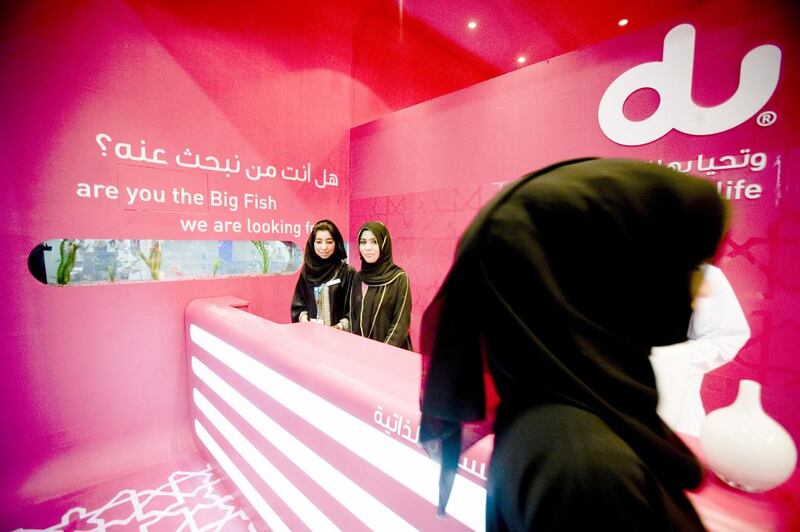Today's Emirati women are far more present in the workforce than their mothers were, but cultural constraints are limiting further growth, even during a time of stepped-up Emiratisation.
Analysts expect the number of Emirati women joining the working ranks to increase at a slow pace, given cultural expectations.
With 2013 as the Year of Emiratisation, the government is focusing on improving the technical skills of the local workforce and reducing their reliance on the public sector for jobs. Government and semi-government jobs in Abu Dhabi alone could support 352,000 Emiratis by 2030.
“The percentage of Emirati women jobseekers is surprisingly low, lower than [comparable local numbers in] other Middle Eastern countries and the Gulf,” said Sara Khoja, a partner at the law firm Clyde and Co’s Dubai office.
About 31.6 per cent of the Emirati labour force consists of women between 15 and 24 years in 2011, according to the International Labour Organization (ILO). The figure stood at 16.40 in 1990. The age group chosen is the most economically active, the ILO says.
The 2011 figures for the UAE are lower than the comparable numbers for Qatar and Bahrain.
For instance, Bahraini women comprised 32 per cent of the Bahraini labour force in the 15 to 24 age group, according to the Geneva-based organisation. In Qatar, it was 34.4 per cent.
“Even in Saudi Arabia, it is higher in certain sectors where local women are encouraged to teach in the schools,” Ms Khoja said.
Catch-up by UAE women is expected to be gradual.
“The numbers will rise but will be very slow because there is no economic imperative for both men and women in a family to earn,” Ms Khoja said.
Cultural expectations also play a major role in the number of Emirati women joining the workforce. Usually many Emirati women give up their jobs after marriage or after they have children.
“It’s not that they don’t have opportunities,” said Samira Daoud, the managing director at Dubai’s SDP Management Consultancy, which advises clients on HR, procurement, finances and market research. “But a lot of Emirati women live in Al Ain and Ras Al Khaimah and can’t be travelling daily or live alone in Dubai or Abu Dhabi. A lot of Emirati women are educated and ready to work but can’t find the right job where they live.”
“Demands of long working hours are not attractive for Emirati women, especially married ones, as they have a lot of responsibilities towards their children,” Ms Daoud said. “Our culture is not always favourable for women to have a career.”
Thuraya Al Awadhi, the founder of Al Awadhi Group of companies, agrees.
“We as UAE women, our biggest support is our leaders because our society is a conservative society,” said Ms Al Awadhi, who stepped into the world of entrepreneurship about nine years ago after having raised seven children.
As part of her business interests, which include a health spa and arranging exhibitions, she hires female Emirati friends on a freelance basis.
“They like that as they don’t have to work fixed hours,” she says.
There are about 11,000 Emirati businesswomen registered with the Emirates Business Women Council, which is under the umbrella of the UAE Chambers of Commerce and Industry and helps businesswomen in networking.
For many working women, the public sector is preferable to the private sector. The reasons include shorter hours, more holidays and higher salaries.
“There is also a perception that once you are in the public sector you are in for life,” Ms Khoja said.
The UAE Government is considering an increase in holidays and a minimum salary for UAE nationals to make the private sector more attractive. There is, however, nothing specific for female employees.
“There is a general reservation to be in the private sector,” Ms Khoja said. “And I do not see a legislation or quotas coming to the UAE private sector for women in general.”
For its part, the private sector is concerned about non-performing employees, and when it comes to employing UAE nationals they are concerned about whether they can fire underperforming Emiratis, said Konstantina Sakellariou, a partner at Stanton Chase.
The executive search firm has been in Dubai for two years but has not received requests to search for female Emirati executives. It has, however, placed five Emirati men in government and semi-government positions.
One small to medium-sized company, On Time, which handles outsourced government documentation among other services, employs 42 female Emiratis out of 240 employees overall at its offices in Dubai.
It also expects to hire another 25 to 30 Emirati women in the next two years.
“Since the first day of our operations, On Time has adopted the government plan to increase the Emiratisation percentage in the company, aiming to reach 50 per cent in the short term,” said Waleid Abdulkareim, the owner of On Time. The company was among the top 100 SMEs last year listed by government agency Dubai SME.
The company helps Emirati women who do not have adequate experience to overcome the challenge through workshops and trainings.
To bridge the gap between the private sector and Emirati women, Ms Sakellariou suggests companies get in touch with young Emirati women and their families to apprise them of the employers’ expectations and to understand the concerns of the families.
“In every country government sector is preferred for many reasons,” Ms Sakellariou said. “But government can’t hire everyone.”
ssahoo@thenational.ae





